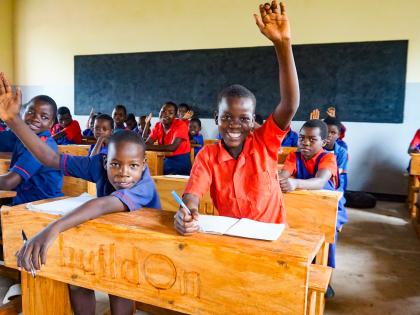Our Educate A Child International Fixed Term Deposit empowers education for marginalised and vulnerable children.


Last year, UK Prime Minister, Boris Johnson had called the first national lockdown just weeks before Ramadan began, meaning that no traditional communal practices could take place. This year, Ramadan falls at the end of the latest lockdown and will be impacted by the government’s roadmap out of lockdown.
Ramadan is predicted to end on May 12, but most social mixing restrictions aren’t expected to be lifted in England until May 17.
How can you remain safe during Ramadan in 2021, enabling it to be a time of reflection and connection, while adhering to restrictions? Maybe the answer is to take everything learned from last year and use new and creative ways to engage with our loved ones and the wider Muslim community.
Come together online.
The World Health Organisation (WHO) has highlighted the pivotal role of technology in overcoming COVID-19 restrictions during Ramadan and has encouraged virtual alternatives using television, radio or digital platforms. For example, you can hold video-calls with loved ones and vulnerable members of the community as part of the daily routine.
As last year, Islamic organisations worldwide will stream nightly prayers, while scholars will share knowledge and encourage individual worship in unison with others globally.
Fast safely.
According to the British Islamic Medical Association (BIMA), if you are feeling well and don’t have an underlying health condition, it should be safe for you to fast during Ramadan. As with any year, people with long-term health conditions such as diabetes are advised to seek medical advice before fasting.
Anyone with an underlying health condition that makes them vulnerable to coronavirus is urged by BIMA to speak to their GP to see if they can safely fast. If your GP does not recommend fasting, you can speak to your local Imam for advice.
BIMA strongly advises that anyone who develops symptoms of COVID-19 consider breaking their fast. Dehydration from fasting could increase the risk of severe illness from the virus, so drinking plenty of fluids is important. For a reminder of coronavirus symptoms, click here.
Eat well.
Proper nutrition and hydration are vital during the month of Ramadan. You should eat a variety of fresh and unprocessed foods every day and drink plenty of water.
COVID-19 vaccinations during Ramadan.
According to the NHS Race and Health Observatory, there have been enquiries about getting a vaccination during Ramadan, and whether it would break the fast. If you are invited for a first or second dose of the COVID-19 vaccination during Ramadan, BIMA has confirmed that there is no reason why you cannot have it.
BIMA has prepared a web page that debunks the myths around the COVID-19 vaccine, and you can find it here.